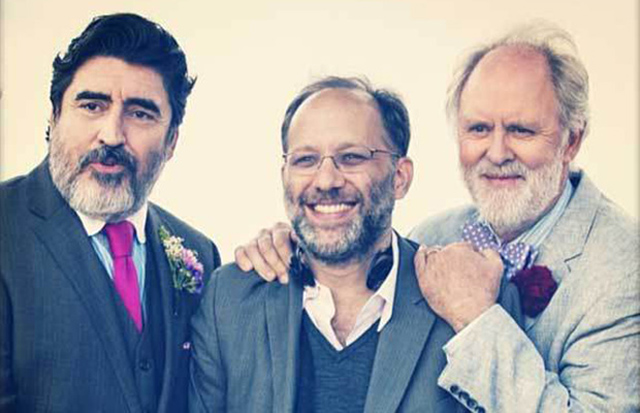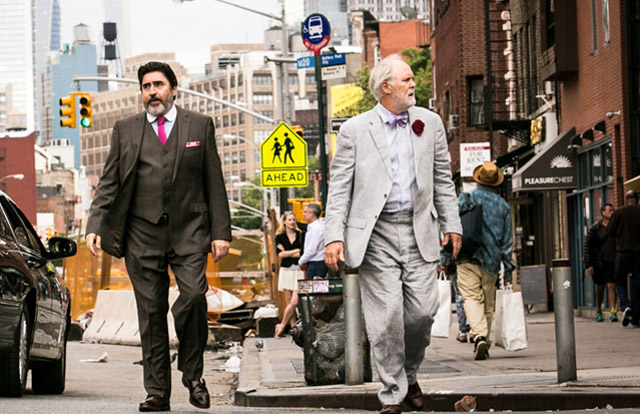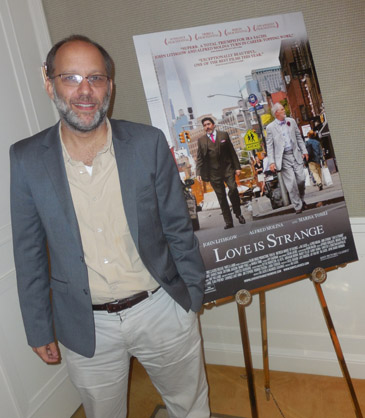CHICAGO – Patrick McDonald of HollywoodChicago.com appears on “The Morning Mess” with Dan Baker on WBGR-FM (Monroe, Wisconsin) on March 21st, 2024, reviewing the new streaming series “Manhunt” – based on the bestseller by James L. Swanson – currently streaming on Apple TV+.
Interview: Director Ira Sachs Reminds Us ‘Love is Strange’
CHICAGO – One of the notable films to kick off the autumn film season is writer/director Ira Sach’s “Love is Strange.” The story of two men in a longtime gay relationship, who finally can marry – but whose lives go off track unexpectedly – features brilliant performances from veterans John LIthgow and Alfred Molina.
Ira Sachs is a veteran writer and director himself, on his sixth feature film. He first got noticed with “Forty Shades of Blue” in 2005 and “Married Life” two years later. The latter film featured Chris Cooper, Patricia Clarkson and Pierce Brosnan. After some great reviews for his fifth film “Keep the Lights On” (2012), he is back with “Love is Strange,” a personal and subtle character driven story.

Ira Sachs (center) with Leading Men Alfred Molina and John Lithgow of ‘Love is Strange’
Photo credit: Sony Pictures Classics
HollywoodChicago.com sat down to interview Ira Sachs, as his life is reflected back in his films, a journey that relates to both the then and the now.
HollywoodChicago.com: I’m sure many people have been referencing the situation in Chicago involving Colin Collette and William Nifong [Collette was fired as a choir director in the Chicago Catholic Church after pictures of Nifong proposing to him surfaced], which is exactly what happens in your film. What incident inspired your take on the situation depicted in the film?
Ira Sachs: I read about a case in the Midwest, in which I know little about on purpose. When I was developing the story, I wanted to make a love story. And when I read about the incident about a Catholic choir director, who was fired when the Church found out about his gay marriage, we thought that would be a great start for a dramatic story. You can call this a drama or it can also be called a remarriage comedy.
When I was in college I read a book called ‘The Pursuit of Happiness,’ which was all about the remarriage comedies of the 1930s and ‘40s – like “His Girl Friday” and “Palm Beach Story.” All of which were about how a couple splits up and we watch them get back together. So in our film, that was the plot turn that gives us insight into their relationship and the surrounding relationships of their families.
HollywoodChicago.com: Ben and George are gay men of a certain generation, with Ben already an adult when Stonewall occurred. What specific statement did you want to make about the suffering and freedoms that occurred in Ben and George’s lives, since they had been a committed couple through so many eras of gay liberation?
Sachs: One thing that I feel is very specific to these characters is that they’re not activists. I think it comes from a type of humility that comes from their backgrounds as people. On the other hand, they are very confident about who they are, so even though they’re not politically fighting, they are ‘being’ in a very certain way.
That was something, that for me as a gay man, was very hard-won. That didn’t seem to be the challenge, at least in the Ben and George we meet. There is a sense in the film, in the scene in which they’re in the oldest gay bar in New York City, they talk about their friend named Frank. For us, in this very short scene, we see a lot of history – the history of them as a couple and the history of their community – Frank’s disappearance can be traced to the AIDS crisis. These two guys are survivors, and you can understand that through the scene.
HollywoodChicago.com: You explored a different kind of gay relationship in ‘Keep the Lights On.’ What fascinates you about your generation of gay men who took so many risks to understand their role in finding relationships?
Sachs: Many people have told me that this film is ‘of the moment.’ But to me what seems timely about the film is that I couldn’t have made it five years ago, because I wouldn’t have had the optimism that I have now. This is a very hopeful film, and I’m in a relationship that I’m hopeful about, and raising kids. In conclusion, I’m glad I’ve worked a lot of my shit out [laughs].
HollywoodChicago.com: Do you think there is an equivalent film in cinema history that has an ‘of the moment’ feel that ‘Love is Strange’ has?
Sachs: There is a movie called ‘Nothing But a Man’ from the mid 1960s. It’s about an African-American couple who get married in the south, and the film follows how the marriage dissolves. So much of it seems as if their love is corroded by the culture they live in. We’re not stronger than our culture, and the reason I’m able to make this film now relates to the laws changing. It’s the impact of the laws changing, which is not insignificant.
HollywoodChicago.com: You had a younger male character, Joey, who is typical of how a large percentage of households are now raising teenagers – open to understanding homosexual without being gay themselves, and accepting gay fellow travelers in their own generation. How do you think this inclusiveness will affect attitudes in the future, contrary to our generation thinking that homosexuality was a separate and frightening issue?
Sachs: I just came from a wedding between two men that have been together for 15 years, and here we were in Orange County with 200 family members running around, and gathering for the ceremony. This is the new ‘now.’ All the feelings we have about how people are about comes from what we learn, it’s really the theme of the film on some level, it’s about education.

Everybody’s Talking: Alfred Molina and John Lithgow in ‘Love is Strange’
Photo credit: Sony Pictures Classics
HollywoodChicago.com: How about the learning experiences of teenagers?
Sachs: In many ways, I’m sympathetic, because I think whenever you have a teenager in the house, you have an alien. It’s not necessarily about homophobia, you just don’t know who that person is at that age, and it makes people jumpy [laughs].
HollywoodChicago.com: Both Molina and Lithgow are straight men, although Molina said in the Variety article that ‘they are the gayest straight men on the planet.’ Did you audition any gay actors for the roles? Do you think the tenor would have been different if it were gay actors, or was it just a matter of getting the right chemistry?
Sachs: You don’t audition name actors. You make offers. I had a sense of what Alfred and John could do. A lot of my job is to actually go and watch their previous work, and understand them in the context of the story. There were definitely openly gay actors on my ‘list,’ but we ended up with these two men and I feel really blessed that was the case.
They were asked in this film to do two things that they hadn’t been allowed to do previously. First, to be the lead actors and second, to perform in a naturalistic register, which is not often what people expected of them in their work in other media, particularly TV. We all had a love for the 1970s performance style in the films at the time, nuanced and tight and subtle. It turns out that both of them are brilliant at doing that.
HollywoodChicago.com: Anything else you’ve learned from them as you got to know them on the promotional tour?
Sachs: I’ve learned a lot recently from Alfred and John, even more than when we shot the film. I’m watching John portraying King Lear for Shakespeare in the Park, working on a new play on Broadway and writing books. I’m experiencing his passion, and its something I can learn from as a creative person.
I also found out that people don’t know the country of origin for Alfred Molina, because he so transformative. People were asking me if he was French, was he born in Mexico? Luckily we’ll finding out more of who he is, one of the most buoyantly generous people I’ve ever worked with, and that comes through in his character in the film.
HollywoodChicago.com: In that same article in Variety, you revealed you were the first openly gay individual in your high school in Memphis. What can you tell us about that time in your life that is a lesson about tolerating differences, and coming to a freedom in our own souls?
Sachs: I was lucky to have a family that was very embracing, that is definitely an advantage for me. I believe that my personal suffering has been equivalent to what I hope is my level of empathy for other people. I became sensitive, and I believe that is part of my job as a director.
I’m raising children now, and they are growing up in a stable environment. My husband and I live next door to their Mom, and we’re co-parenting. They know they are loved on a daily basis, and I’m praying for them to have less suffering because of that love.
HollywoodChicago.com: Which era of gay life from 1900 to now is most fascinating to you as a storyteller, and how would you potentially put that to screen?
 Ira Sachs in Chicago, August 14, 2014 Photo credit: Patrick McDonald for HollywoodChicago.com |
Sachs: What was extremely inspiring in that sense is within a eight minute film I made called ‘Last Address,’ which is available on line. It was about a group of New York City artists who passed away from AIDS, and I went to their last place of residence. It was about the loss, but also about the presence. In the process of making that film, I became very familiar with a certain subculture that were living in New York City in the late 1980s – they passed from the early gay liberation freedoms through the AIDS crisis. Knowing those artists was deeply significant, because they were so radical. They were not looking to be loved, but to make images that were different.
Personally, making that film was transformative. First, I did it without ‘permission,’ I made this film purely independently – I made it at the top level as an artist, and it was empowering because it made me feel young again.
HollywoodChicago.com: Back to the movies, which directors influence you the most, and do you ever pay a tribute to them with certain scenes in your films?
Sachs: Look at the poster, it’s my homage to ‘Midnight Cowboy.’ [Pictured above] I carried that image of Ratso Rizzo and Joe Buck from the film, because I felt these were men from the outside who took New York by storm – it’s like the ‘Muppets Take Manhattan’ [laughs]. It is directors like John Cassavetes, Yasujiro Ozu and Ken Loach who I have discovered in recent years, and they are part of my creative influence.
My film ‘Married Life’ was influenced by the high melodrama of early studio films, especially Joan Crawford films. Joan Crawford taught me who a movie star should be.
HollywoodChicago.com: I find that the gay liberation movement has had challenges in our lifetime because of the specter of prejudice, the stereotyping based on one or two images, and the AIDS crisis. In your experience, what did you see as the breakthrough for gay liberation, that led to the current climate of marriage and mainstream acceptance?
Sachs: I think that the breakthrough came from familiarity, and I hope that people who leave this movie will accept a couple like Ben and George. That is where the transition happens. It was a series of small steps in our lifetime, one step forward and one backward.
If we look at this situation in Chicago, in a way it’s terrible, because a man lost his job because he became engaged to someone he loved. On the other hand, there were 700 people at a meeting voicing their opinions on the situation, and the openness of that experience is extremely significant. This is a battle that is similar to the civil rights movement. The shifts are happening within the conflict, they are not separate from the conflict.
 | By PATRICK McDONALD |


